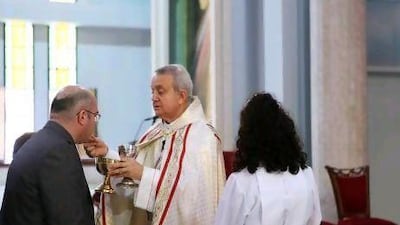BEIRUT // Every Sunday, Christian Thoumy and his family join dozens of other worshippers seated on the wooden pews of St Joseph's Church.
Standing in front of the congregation is Father Issam Ibrahim, dressed in flowing white robes, trimmed with red. Above the worshippers is a high, domed ceiling painted powder blue and decorated with clouds and cherubs that appear to float around three cross-shaped skylights.
Young children play in the back of the church, as their parents and other members of the community sing hymns and listen as Father Issam conducts the Maronite service before ending with "Kul eid wa intum bkheir", passing on his blessings.
This is Mar Yousef, or St Joseph's Church, in the heart of Haret Hreik in Dahiyeh, south Beirut. The area is part of the Lebanese Shiite movement's security zone - under the control of Hizbollah.
Yet every Sunday dozens of families return to the church from other parts of Beirut and further outside the capital.
"It's good here and very nice to come to pray in our church," said Mr Thoumy, 17, standing in the sun outside after the service. "Some people think it's weird to come here to pray in Dahiyeh. But, if they come here, they see that it's normal."
Although Mr Thoumy and his family now live in Sheile, an area to the north-east of Beirut, they still attend mass at St Joseph's every Sunday.
The Haret Hreik neighbourhood and wider Dahiyeh suburbs are known as the stronghold of Beirut's Shiite community.
Just opposite the sand-coloured church that sits on a small hill is the house of Mohammed Hussein Fadlallah, the late Lebanese Shiite cleric.
In Lebanon's divided sectarian environment, it is seen by some as a separate canton just a few kilometres from central Beirut.
But, Christian families have also called the area home for generations. Thousands were forced to flee during the battles of Lebanon's 15-year civil war. Others left after the neighbourhood was bombarded by Israel during the war in July 2006.
Now there are believed to be only about a dozen Christian families left in Haret Hreik, but about 130 worshippers from across Beirut and beyond attend St Joseph's and on special occasions there can be as many as 2,000 people crammed into the church.
Christian's father Elias Thoumy, 52, still works in Haret Hreik where he has a menswear shop and sits as a member of the local municipality. His family left their home in the neighbourhood in 1977 at the beginning of the civil war.
"Every day I come here and I am at home," said the father of three. "I tell people outside this area that in Dahiyeh, there are people like you. We are all Lebanese and it's very important for us to maintain this connection with our home."
Father Issam, 60, has spent the last three decades as the priest at St Joseph's, which was built in the late 1940s. Despite the fighting during the civil war, the church sustained damage but was not destroyed. The congregation stopped attending mass for several years.
Then in 1999, amid efforts to encourage people to return, renovations began to fix the shattered windows and broken doors. After the Israeli assaults in 2006, they again rallied to renovate their church.
The community, Father Issam said, is respected by Hizbollah and its Shiite neighbours.
"The people live here in Haret Hreik with the Muslim people, there are no problems since many years. It is the land of our ancestors, it is our country," he said. "The people will continue to come to the church on Sunday and for every feast."
Rony Khoury, 44, his wife and three children are among those who have remained in Haret Hreik, where his family has lived for generations.
"I have spent all my life here, even during the civil war," Mr Khoury said. "Only when Israel attacked in 2006 we left for 30 days because it was very dangerous."
Pictures of Jesus and the Virgin Mary are propped up next to candles on a small shrine in a corner of one of the rooms of the home that belonged to his late parents. Now he lives there with his wife, Rania Chamoun, and children - Cassandra, 9, Elias, 6 and Vania, 5.
Mrs Chamoun comes from the majority Christian town of Zahle. She said that initially she was apprehensive about moving to the majority Shiite neighbourhood. Now she feels at home.
"I am insisting to stay here," Mr Khoury said, seated outside on their veranda overlooking a small garden. "I am Christian, I live as a Christian and I will keep being a Christian. Nobody can change that. And I will always be from Haret Hreik."

